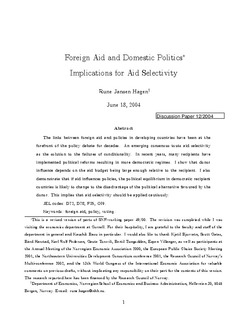| dc.contributor.author | Hagen, Rune Jansen | |
| dc.date.accessioned | 2006-08-03T07:26:16Z | |
| dc.date.available | 2006-08-03T07:26:16Z | |
| dc.date.issued | 2004-06 | |
| dc.identifier.issn | 0804-6824 | |
| dc.identifier.uri | http://hdl.handle.net/11250/163278 | |
| dc.description.abstract | The links between foreign aid and policies in developing countries have been at the
forefront of the policy debate for decades. An emerging consensus touts aid selectivity
as the solution to the failures of conditionality. In recent years, many recipients have
implemented political reforms resulting in more democratic regimes. I show that donor
influence depends on the aid budget being large enough relative to the recipient. I also
demonstrate that if aid influences policies, the political equilibrium in democratic recipient
countries is likely to change to the disadvantage of the political alternative favoured by the
donor. This implies that aid selectivity should be applied cautiously. | en |
| dc.format.extent | 380568 bytes | |
| dc.format.mimetype | application/pdf | |
| dc.language.iso | eng | en |
| dc.publisher | Norwegian School of Economics and Business Administration. Department of Economics | en |
| dc.relation.ispartofseries | Discussion paper | en |
| dc.relation.ispartofseries | 2004:12 | en |
| dc.subject | foreign aid | en |
| dc.subject | voting | en |
| dc.subject | policy | en |
| dc.title | Foreign aid and domestic politics : implications for aid selectivity | en |
| dc.type | Working paper | en |
